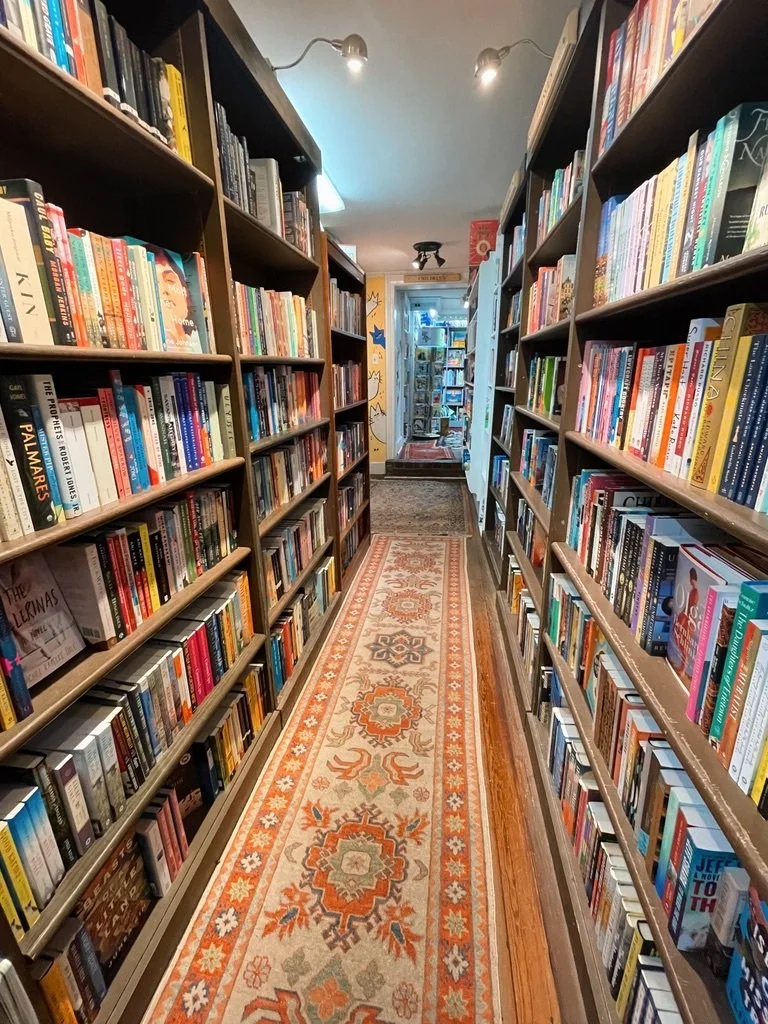Today at the Bookstore
The shop is quiet in the first few minutes after opening, the kind of quiet that feels less like absence and more like a room inhaling before the day begins. I switch on the lamps one by one, their warm light pooling across the displays. The spot in the floor catches my foot the way it always does, a small reminder that this building has held more stories than any of us ever will. Outside, Main Street is still finding its rhythm. A delivery truck idles, someone walks a dog, the coffee shop two doors down pulls out their tables to the sidewalk..
I like this hour. It’s the slow easing-in before conversations begin and the door starts its steady pattern of opening and closing. I straighten a stack of new releases, nudge a few spines back into place, and let my mind settle. Owning a bookstore wasn’t something I planned in a straight line. It was my retirement job, but at 29 I found it to be the relief needed from a fast pace federal career. It grew out of an old habit of wandering shops like this in every city I lived in, of finding comfort in shelves arranged with care, of wanting to build something quiet but sturdy in the middle of downtown. My favorite bookstore in the world is Capitol Hill books, an old row house given new life, an oasis in the middle of DC, a city that always has another crisis to worry about. Opening Johnson’s Literary Depot taught me how work can become an extension of place, how intentional spaces gather people who might otherwise pass each other without noticing.
The first customer of the morning is an older man who comes in one or two times a week. He never stays long. Just walks the aisles slowly, scanning the shelves as if checking on old friends. Today he pauses at the nature section, runs his finger across a title, nods to himself, and carries it to the counter. We talk for a moment about the changing light this time of year, how the mornings feel different when the air cools. His presence reminds me that a bookstore is not really about selling books. It’s about hosting small encounters that give shape to a day.
Later, a young couple wanders in with takeaway coffees, drifting between displays. They stop at a table of fiction, pull out a book, and read the first page together. I watch from behind the counter as their shoulders lean in at the same angle. Moments like this always feel tender. People soften when they read beside each other. The world shrinks to a shared paragraph.
By midday the shop is buzzing. A few regulars sit cross-legged on the rug with small stacks growing beside them. A pair of downtown employees stop in on their lunch break. A high school student asks for something “quiet but not boring,” which is one of my favorite challenges. Between conversations, I restock a cart near the front door. The bell rings every few minutes, the sound blending into the background like a heartbeat.
Running a bookstore has taught me the value of slowness in a culture that worships speed. It has shown me what it means to build something rooted, something that gives more than it takes. In the middle of editing grant applications or attending planning meetings for downtown projects, I sometimes forget this. But a day behind the counter brings it back into focus. The work is simple, but not small.
As the afternoon light begins to soften, I look around the room. People are scattered across the space, each carrying on their quiet search for meaning, escape, or clarity. The scene is ordinary. That’s what I love about it. Ordinary moments, noticed closely, carry a kind of steadiness we often overlook.
When I lock the door at closing time, the shop feels different than it did in the morning. Not quieter, exactly. Just fuller. A bookstore holds the echo of every person who stepped inside that day. And as I turn off the lamps, one by one, I’m reminded that this daily rhythm is its own kind of offering. It asks very little. Pay attention. Hold the door open. Let people find what they need, even if it’s just a few minutes of calm on their way to somewhere else.
